Gandhiji asked me if I had sufficient warm clothes in view of the coming cold season. I said yes.
But he verified my statement by asking Miraben to search my bag to make sure.
Such was Gandhiji.
The final part of a multi-part series:
- Part 1: My Days With The Mahatma
- Part 2: 'I was told not to accept money from Gandhiji'
- Part 3: When Mahatma Gandhi Gave British Sleepless Nights
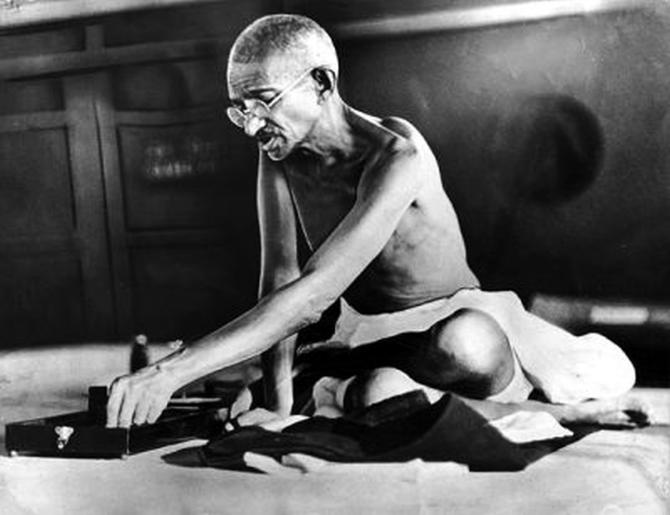
Gandhiji did not permit Kasturba to accompany him on the Harijan tours, even though she insisted, even crying, saying that she should accompany him to look after him.
When I think of Kasturba I remember my grandmother -- so simple and affectionate.
After about two months in Wardha, the famous all India Harijan tour of Gandhiji was finalised. It began in November 1933.
Before starting, Gandhiji asked me if I had sufficient warm clothes in view of the coming cold season. I said yes. But he verified my statement by asking Miraben to search my bag to make sure. Such was Gandhiji.
Apart from Gandhiji the party consisted of Prabhavatiben (wife of the famous JP [Jayaprakash Narayan]), Chandrasanker Sukhla (secretary), myself and one or two others. En route we visited several villages.
Gandhiji addressed several gatherings and after 3-4 days one day we reached Amravati in the afternoon where he addressed a big gathering.
At night we retired to a building with a room at each of the four corners of its terrace, reserved for the use of Gandhiji and party.
Gandhiji sat in one room, using another as a water closet. The rest of us occupied the other rooms.
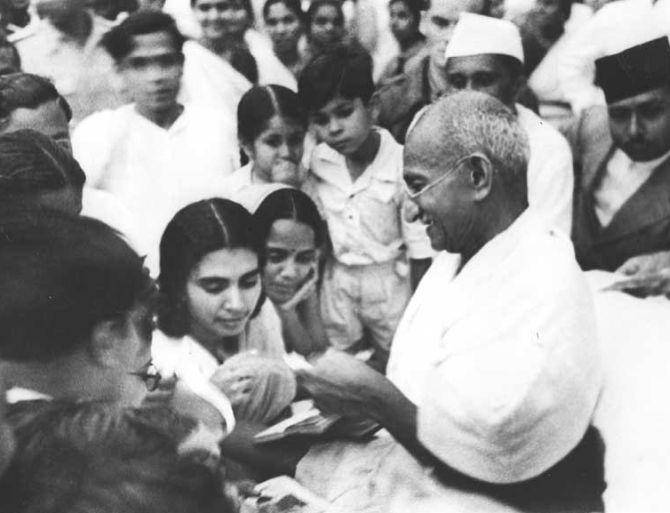
He told me to wake him up at 3 am so that he could deal with a lot of letters awaiting his attention. At about 10 pm, he went to sleep in the open, in the middle of the terrace.
While the rest of the party slept in the third room, I took my bedding and slept in the fourth room where there was a big gas light making a hissing noise. It did not matter.
I was feeling sleepy and the climate was pleasant. But I had my alarm watch by my side that I kept checking to ensure I got up before 3 am.
At 2.40 am, I checked the time again. When I turned in the bed, I was struck by some completely covered figure sitting there.
I was frightened at first, but then concluded it could only be Gandhiji. It was.
Gandhiji looked at his own watch and asked me to go to sleep as there were still 20 minutes left.
I, however, got up and went out to wash and be ready for work, while he sat working on the letters in the middle of my bed.
Gandhiji had arisen at 2 am, and gone to his room. Failing to find matches to light the hurricane lamp (as there was no electricity in that town at the time), washed up using the starlight above, and went to his sitting room.
He then collected the papers atop his table and came to my room. While sitting on my bed, his head covered, he began reading the letters to reply to. We continued working till 4.30 am, when it was time for prayers.
I know my limitations, but such incidents in my life with Gandhiji gave me self-satisfaction and contentment.
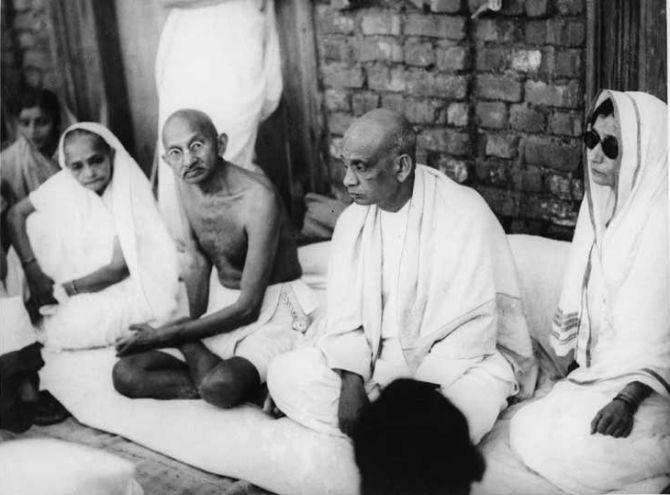
I was not fortunate enough to make money, even after serving in various capacities for more than 50 years. But my wealth is the happy moments I had while with such big and God-like leaders as Gandhiji, Sardar Patel, Bhai (Bhulabhai Desai) etc, and the close contacts I maintained with several other Indian national leaders.
There were many such happy anecdotes; I mentioned only a few of them here. It is the thought of these incidents and the satisfaction I derived while being with such great leaders in my earlier days that helped me through all the trying times I endured later.
Apart from the kind treatment I was fortunate enough to get from Gandhiji, Sardar Patel, Sri Jairamdas Doulatraman and others in my early days, I must say, I owe a great deal to 'Bhai' He was one of the greatest personalities India had then.
Inspite of amassing wealth by practicing in the Bombay high court, he became a leader of the Congress party and a member of the central legislative assembly.
Under a British government, he was thus the leader of the Opposition in the legislative assembly.
Pandit Govind Ballabh Pant was the deputy leader, S Satyamurthi the secretary, and Asaf Ali the chief whip. It was trying for the government to deal with Bhai in the assembly.
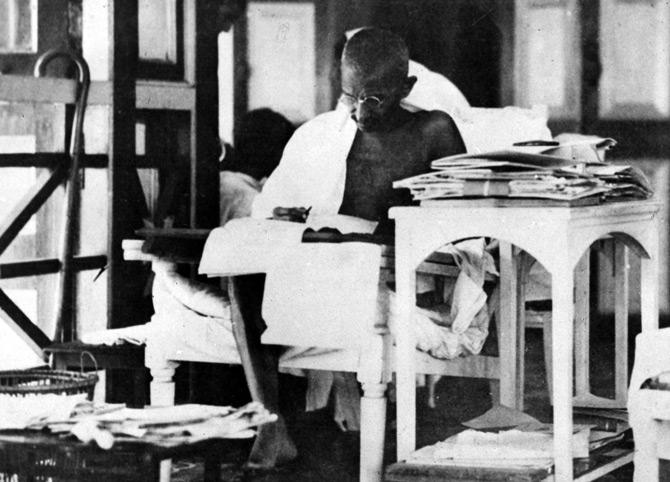
M A Jinnah, then the leader of the Muslim League in the assembly, had his own policy of dealing with the government and siding with the Opposition. Bhai gained all India fame after the successful INA trial in early 1946.
But the stress of the trial took its toll, and he lived only for about four months before the end came. He had made enough sacrifices for the freedom of India and had undergone imprisonment for years.
He missed seeing India free and independent because he passed away on May 5, 1946.
I have every reason to miss him and his kind treatment. He often assured me that I need not worry about my future.
During the last three months, when he was ailing and bed-ridden in the library building of the bungalow, soon after the INA trial, he wanted me to sit on a chair just outside the bedroom the whole day, facing the sea. I could leave only for food or tea in the kitchen in the bungalow.
Some times he used to check whether I was in my seat. Often he used to ask me to massage his swollen legs which I used to do.
I felt he got some relief from that. He believed that Malayalis generally knew how to do massages.
So, in those three months I was by his bedside till his death, even though sometimes Dhirubhai (his son) used to ask me to attend to several telephone from the public asking about Bhai's health.
Because the telephone was in the house nearby, Bhai did not like me leaving my seat, pointing out that there were several other persons to attend to the calls. I still cherish his goodwill and kindness.
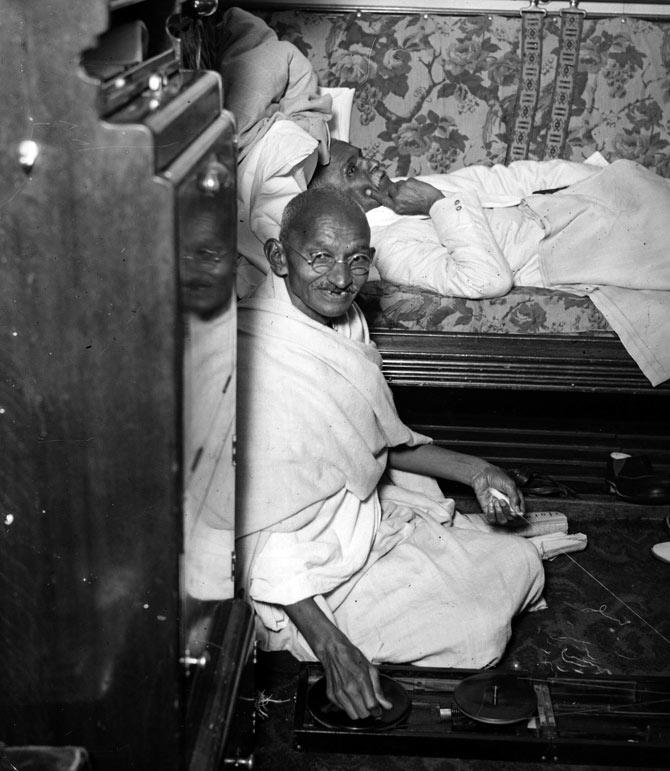
I have great regard for Dhirubhai. I owe him a lot. He was born with a silver spoon in his mouth.
Such people usually cannot realise other people's difficulties. But Dhirubhai was different.
He had a kind heart and several persons and institutions had benefited from it.
He also joined the 1942 Congress movement as acting president of the Bombay Provincial Congress committee and was arrested at Gowalia Tank on August 9, 1942 at the Congress (Quit India Movement) gathering there.
He was in jail for a few months. It was most unfortunate that he, too, did not live long enough to serve his country longer.
I believe Bhai's desire was that his son practice law, for which he was already qualified, at the Bombay bar and lead a peaceful contented life. But due to Dhiruhbhai's initiative and drive, in 1946-1947, he set up the now famous Atul Products Ltd in Bulsar.
In 1948 he entered the India Foreign Service and left for Berne to become India's ambassador in Switzerland. He died there in 1951 at the age of 44.
Dhirubhai is another person I cannot forget for all the help and kindness he extended to me from time to time.
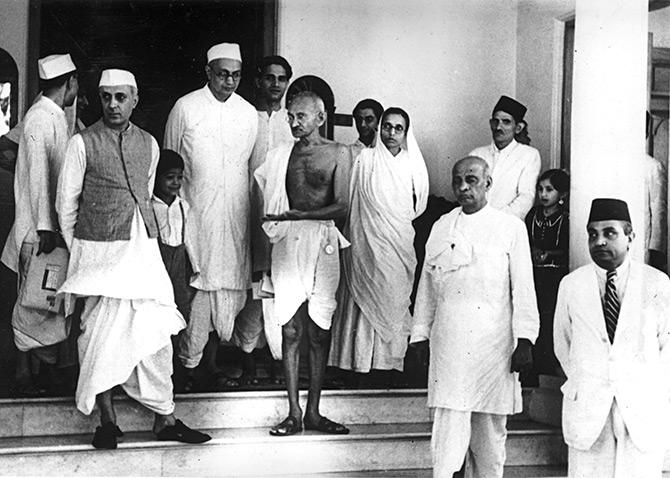
An incident I recall from much earlier, is from the civil disobedience movement in Bombay, in or about July/August 1932.
The city police commissioner had asked Miraben, who was in the movement, to leave Bombay immediately. Her immediate reaction was to defy the order. But friends persuaded her to leave for Benares to see Pandit Madan Mohan Malavya, who was a leader then out of jail. She wanted me to accompany her.
So both of us left for Benaras where we stayed at the residence of Shivprasad Gupta, on the bank of the river Ganga, upstream of the ghats.
There we stayed about for a month-and-a-half, keeping in touch daily, either through telephone or in person, with Malavyaji, who lived about a mile away in the University compound.
I remember once working a full day with Malavyaji, even taking my lunch at his place.
While we were staying in Benares, at the suggestion of Malavyaji, we attended a meeting in secret with leaders like Rajaji, Babu Rajendra Prasad, Malavyaji, Miraben and others who were not in jail at the time.
The leaders took stock of the civil disobedience movement and planned future courses of action. All this while, the CID followed us wherever we went.
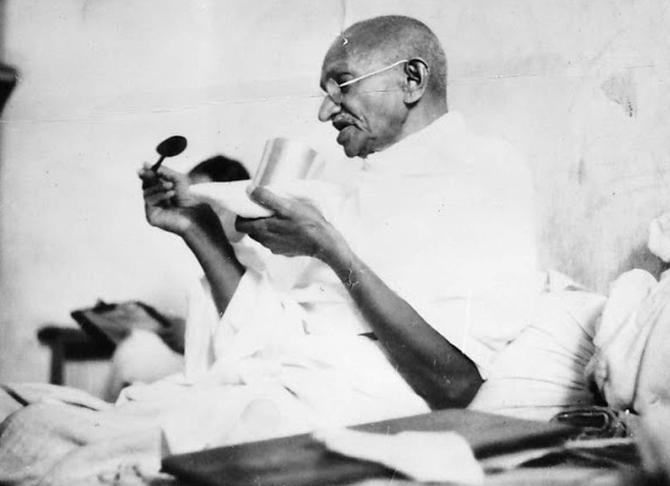
After this meeting, one day we came to know that Rajan Babu had fallen ill at his home town Chhapra in Bihar, about 100 miles from Benares.
At the instance of Malavyaji, Miraben and I set out to meet him. When we reached Rajan Babu's house in the early morning on the next day, the police followed and served an order on Miraben asking her to leave Chhapra within 12 hours.
Though Rajan Babu insisted that she should leave, she refused to do so, saying she would only leave the next morning and that if the police wanted sometime before then, then so be it. We were sure that she would be arrested that night.
As for myself, as I had to carry some important papers of Rajan Babu to Malavyaji, they hid me in an underground grain store cell all night.
The plan was to get me back to Benares the next day from a station on the way.
Sitting in the cell the whole night was torture for me as there was no light or air available. Besides big mosquitoes biting me all over, I could not cover myself because of the sweltering heat.
Early the next morning, the door was opened for me to let me out. That is when I learned that the police had not taken Miraben away in the night.
So we both started by train for Benares, reaching there by evening where we were again greeted by the CID.
After a few days of staying in Benares we returned to Bombay, where the police arrested Miraben and took her to jail.
In Bombay I continued to work in the civil disobedience movement till I was summoned to go to Poona in April 1933 when I first started working with Gandhiji in the central prison there.
Translated from the Malayalam by Pottayil Aravindakshan Nair.
Feature Presentation: Rajesh Alva/Rediff.com
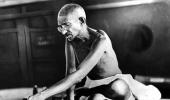
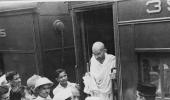
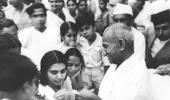







 © 2025
© 2025